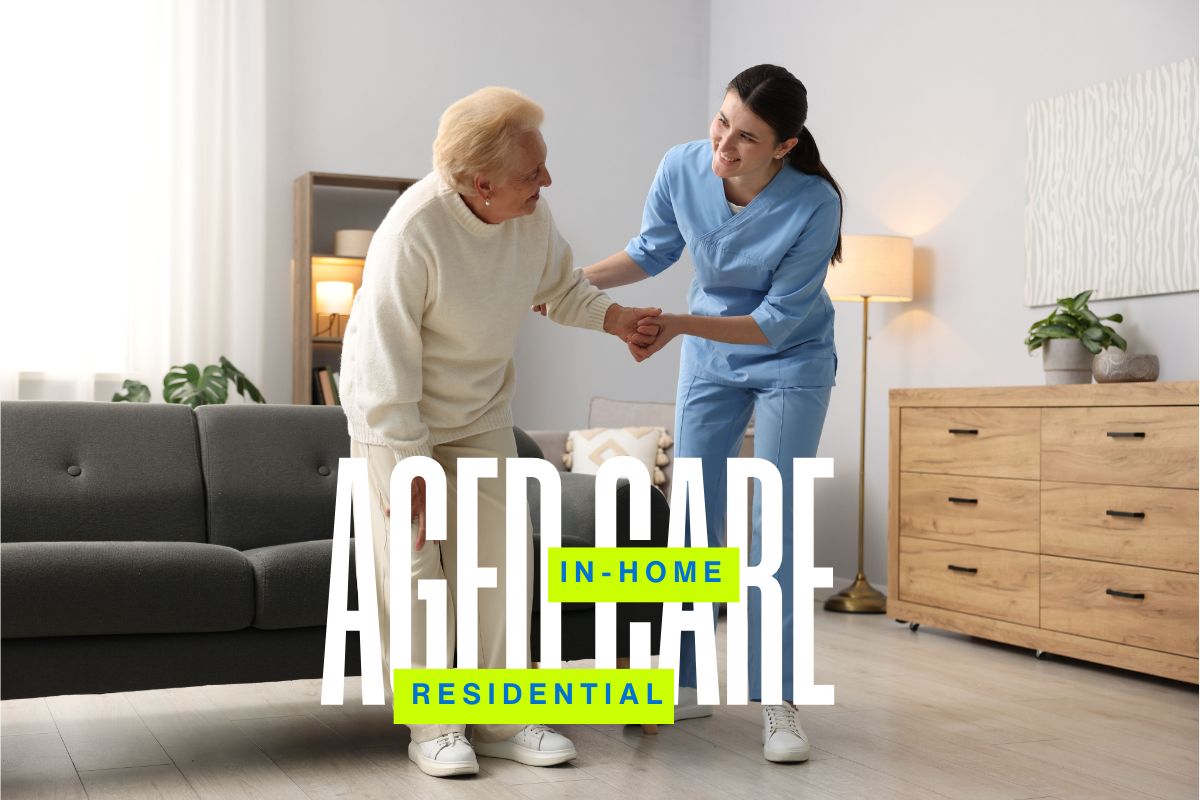In-Home Care vs. Residential Aged Care in Adelaide
|
Getting your Trinity Audio player ready...
|
Quick Summary: Choosing between in-home care and residential aged care in Adelaide depends on care needs, safety considerations, personal preferences, and financial situation. In-home care supports independence at home, while residential care provides 24/7 support in a facility setting.
Introduction: The Big Decision After Your ACAT Assessment
Receiving an “Aged Care Assessment Team (ACAT)” approval marks a significant milestone, but for many Adelaide families, it’s also the beginning of one of the most challenging decisions you’ll ever face. The paperwork is done, the assessment is complete, but now you’re left with the emotional and practical question:
“Is it better for my loved one to receive support at home, or is it time to consider a residential aged care facility?”
This decision touches on everything from personal independence and safety to family dynamics and financial planning. As your local Adelaide aged care specialists, we’ve guided hundreds of families through this exact situation. This comprehensive guide will break down the differences, costs, and services to help you make an informed choice that respects your loved one’s dignity and preferences.
At a Glance: In-Home Care vs. Residential Aged Care
Before we dive deep, here’s a quick comparison of the two main aged care options available in Adelaide:
| Feature | In-Home Care | Residential Aged Care (Nursing Home) |
|---|---|---|
| Location | You stay in your own home | You move into a specialised facility |
| Level of Care | Flexible, from basic help to complex nursing care | 24/7 clinical care and supervision |
| Best For | Seniors who want to remain independent but need help with daily tasks | Seniors with complex medical needs or who can no longer live safely at home |
| Funding | Government subsidy paid to a provider + small client fees | Combination of daily fees, means-tested care fees, and accommodation costs |
Deep Dive: What is In-Home Care?
Who is In-Home Care For?
In-home care is designed for Adelaide seniors who can still live safely at home but need regular support with daily activities. This option prioritises independence, familiarity, and maintaining connections within your local community.
In-home care might be right if:
- You value your independence and want to stay in your familiar surroundings
- Your home is safe and can be modified if needed (grab rails, ramps, etc.)
- You have family or friends nearby who can provide additional support
- Your health conditions are stable and don’t require 24/7 medical supervision
- You’re approved for a Home Care Package Level 1-4 through your ACAT assessment
How is In-Home Care Funded?
In Adelaide, there are two main government-funded programs for in-home care:
Commonwealth Home Support Programme (CHSP)
For: Basic, entry-level support
Services: Cleaning, social transport, home maintenance
Access: Through a Regional Assessment Service (RAS) assessment
Home Care Packages (HCP)
For: More comprehensive, coordinated care
Levels: 1 (basic) to 4 (high care needs)
Access: Through an ACAT assessment
What Services Are Included in In-Home Care?
🧓 Personal Care
Showering, dressing, grooming, toileting assistance
🏠 Domestic Help
Cleaning, laundry, gardening, home maintenance
🍎 Meal Preparation
Cooking healthy meals, special dietary support
💊 Clinical Care
In-home nursing, medication management, therapy
🚗 Transport & Social
Shopping, appointments, social outings, community access
🛡️ Safety & Support
Home modifications, technology aids, care coordination
Deep Dive: What is Residential Aged Care?
Who is Residential Aged Care For?
Residential aged care (often called nursing homes) provides 24/7 care and accommodation for seniors whose needs can no longer be safely met at home. This option becomes necessary when continuous supervision and medical care are required.
Residential care might be right if:
- You have complex medical needs requiring regular nursing care
- You have advanced dementia or cognitive decline that affects safety
- You’re at high risk of falls or other safety concerns at home
- You feel isolated or lonely living alone
- Your care needs have become too demanding for family to manage
- Your ACAT assessment recommends residential care
How is Residential Aged Care Funded?
Residential aged care in Adelaide operates on a cost-sharing model between the government and residents:
- Government Subsidy: The government pays a subsidy to the facility for each resident’s care
- Resident Contributions: Residents contribute to their care and accommodation costs based on their financial situation
What Services Are Included in Residential Aged Care?
🏥 24/7 Staffing
Registered nurses and care workers always on-site
🏠 Accommodation
Private or shared room with all utilities included
🍽️ All Meals
Three nutritious meals plus snacks daily
💊 Clinical Care
Full medication management and complex health care
🧹 Cleaning & Laundry
All housekeeping and personal laundry services
👥 Social Activities
Organised activities, outings, and social programs
The Financials: Comparing the Costs in Adelaide
Understanding the costs involved is crucial for making an informed decision. Here’s a breakdown of what to expect financially for each option in the Adelaide market.
Cost of In-Home Care
Home Care Package Fees:
- Basic Daily Fee: Everyone pays this (currently $11.22 per day for HCP Level 1)
- Income-Tested Care Fee: Some people pay this based on income assessment
- Additional Services: You might pay extra for services beyond your package value
Benefit: Generally more cost-effective for low to moderate care needs, and you retain your assets (your home).
Cost of Residential Aged Care
Residential Care Fees:
- Basic Daily Fee: Everyone pays this for living costs (currently $61.96 per day)
- Means-Tested Care Fee: An extra contribution based on income and assets assessment
- Accommodation Payment: The biggest cost difference – this covers your room
Accommodation Payment Options:
- RAD (Refundable Accommodation Deposit): A lump sum payment (typically $300,000-$550,000 in Adelaide) that’s refunded when you leave
- DAP (Daily Accommodation Payment): A daily payment instead of a lump sum
- Combination: Part RAD, part DAP
Pros and Cons: A Quick Summary to Help You Choose
Conclusion: How to Make the Right Choice for Your Family
There is no universal “right answer” when choosing between in-home care and residential aged care in Adelaide. The best choice depends on a combination of factors unique to your situation:
Key Considerations for Your Decision:
- Care Needs: What level of care does your ACAT assessment recommend?
- Safety: Can your home environment be made safe for your current needs?
- Personal Preferences: How important is maintaining independence and staying at home?
- Social Needs: Would you benefit from more social interaction?
- Financial Situation: What can you comfortably afford long-term?
- Family Support: How much help can family realistically provide?
💡 Adelaide-Specific Insight
Many Adelaide seniors are choosing to “age in place” with in-home care, supported by local services and community programs. With proper support, most people can remain safely in their homes much longer than previously thought possible.
Your Next Step: Expert Guidance from Your Local Adelaide Team
If your ACAT assessment has approved you for a Home Care Package, staying in your own home is a fantastic option that maintains your independence and keeps you connected to your community.
At Humanity Care Australia, our Adelaide-based team specialises in providing compassionate in-home aged care that supports your independence while ensuring your safety and wellbeing.
Contact us today to discuss how we can use your approved package to build a personalised support plan that’s right for you, your family, and your lifestyle.
Frequently Asked Questions About Aged Care Choices in Adelaide
1. Can I try in-home care first before considering residential care?
Absolutely. In fact, this is the recommended approach for many Adelaide families. Starting with in-home care allows you to maintain independence while receiving the support you need. If your needs change and become too complex for in-home care, you can transition to residential care later.
2. How long is the wait for a Home Care Package in Adelaide?
Wait times vary depending on the package level you’re approved for. Lower-level packages (1-2) typically have shorter waits (1-3 months), while higher-level packages (3-4) may take 6-12 months. During this waiting period, you may be able to access interim support through the Commonwealth Home Support Programme.
3. What happens if my care needs increase while I’m receiving in-home care?
Your care plan is regularly reviewed and can be adjusted as your needs change. If you need more support, we can apply to upgrade your Home Care Package level. If your needs become too complex for in-home care, we’ll help you transition to residential care when the time is right.
4. Can I keep my doctor if I move into residential care?
Most residential facilities in Adelaide will try to accommodate your existing GP, but this depends on the facility’s location and your doctor’s availability. Some facilities have visiting GPs or can help you find a new local doctor if needed.
5. What if I change my mind after choosing one option?
You’re not locked into your decision permanently. If you start with in-home care and later decide you need residential care, you can apply for residential placement. Similarly, some residential facilities offer respite care or trial periods before you make a permanent move.
6. How do I know if my home is suitable for in-home care?
As part of developing your care plan, we’ll conduct a home safety assessment. We’ll identify any modifications needed (like grab rails or ramps) and help you access funding for these through your Home Care Package or government programs.
Making the Right Choice for Your Adelaide Family
Choosing between in-home care and residential aged care is one of the most significant decisions your family will make. Remember that this isn’t a permanent, irreversible choice – many Adelaide seniors successfully transition between different levels of care as their needs change.
The most important factor is finding the solution that provides the right balance of safety, comfort, independence, and quality of life for your unique situation. Whether you choose to age in place with support or transition to residential care, what matters most is that you feel respected, supported, and in control of your care journey.


